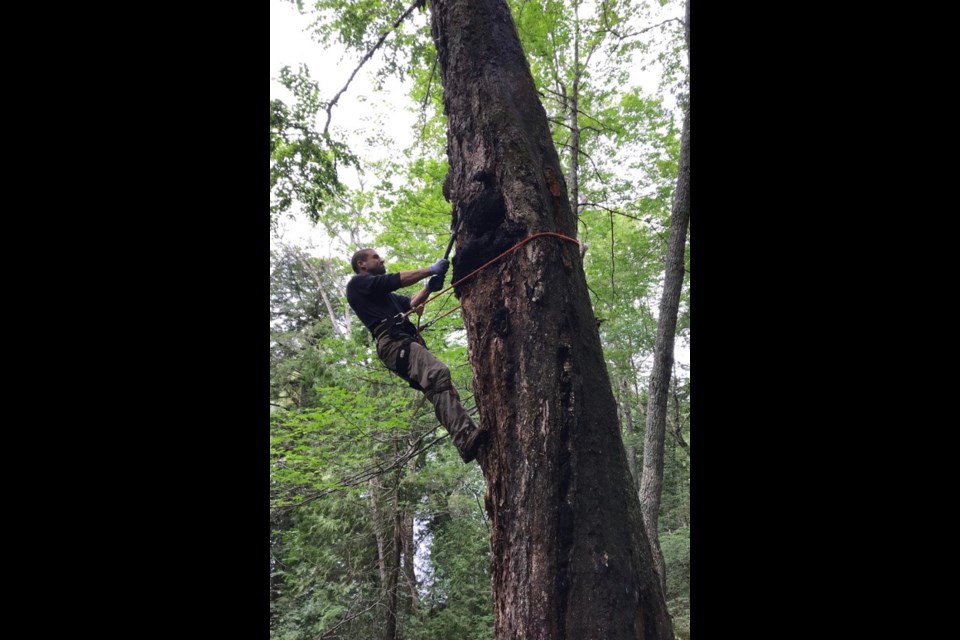Chaga – nature’s ‘black gold’ – is taking the health-food market by storm, and an Algoma producer is riding the wave of this new trend.
Since incorporating in 2017, Sault Ste. Marie-based TruNorth Chaga has been harvesting the fungus from the region’s birch trees, processing it, and selling it to wholesale and retail customers across North America.
Cody McElrea, TruNorth’s founder, said he first became interested in chaga while living on Vancouver Island, B.C., where he learned about foraging wild foods.
“I heard about chaga on the West Coast, and when I came back here, I was surprised and happy to see that it grows all over the place here,” said McElrea, who hails originally from Goulais River, just north of the Sault. “It’s one of the best places in the world (to find it).”
Inonotus obliquus, more commonly known as chaga, manifests itself in white and yellow birch trees that have experienced trauma. As the fungus expands, it produces a hard, charred-looking growth called a ‘conk.’ Peel away the outer layer, and the mushroom reveals its orange, cork-like flesh, which is prized by users for its antioxidant properties.
McElrea employs four to five part-time harvesters, who are paid piecemeal to find and harvest the fungi.
Chaga favours cool temperatures, flourishing in birch tree stands all through the Great Lakes/St. Lawrence forest region. McElrea said he’s even extended his harvest area to Nova Scotia to ensure a steady supply.
Once extracted from a tree, chaga can take up to five years to grow back, and so McElrea is steadfast in his approach to sustainable harvesting.
His crew won’t remove anything under two pounds, and at least 20 per cent of the mushroom is left behind for regrowth, he noted.
The use of GPS technology helps track which trees have been harvested, so they’re not constantly returning to the same area.
But chaga must be processed before it can be consumed, McElrea said, and that’s where TruNorth comes in.
“With the raw product, it's not bioavailable to the human body, so if you were to just eat chaga, your body won't process it,” he said. “So what you have to do is you have to make some kind of extract with it.”
The company produces and sells the mushroom in a number of formats – chunks, a tincture, and powder – which can be used to brew tea, added to drinks, or sprinkled over food. Chaga’s earthy flavour is said to have notes of vanilla.
A four-ounce bag of chaga chunks costs about $18, while an eight-ounce bag runs $33.
Recently, TruNorth opened a 1,500-square-foot production facility in the city’s north end, with drying racks, a grinder and a hammer mill set up for processing.
McElrea said he’s looking at upgrading the equipment to make the process more efficient, but he’s also working with a local chemist on an extraction method that concentrates the chaga into an “easily consumable dose.”
Over the last few years, the company has been targetting the Canadian wholesale market, which McElrea estimated makes up about 80 to 90 per cent of his sales.
TruNorth is now transitioning into the retail side of sales, targetting health food stores, coffee shops, restaurants, and other like-minded merchants.
It’s set its sights on the U.S. and Asia in particular, but McElrea has sales reps looking for opportunities in Alberta and Manitoba as well.
With chaga increasing in popularity, McElrea believes the industry is ripe for growth.
Between 2017 and 2018, his revenue nearly doubled, and 2019 is already shaping up to be a good year for sales.
McElrea is also looking at expanding his product line. The company currently has product applications in to Health Canada for approval to sell two other wild mushroom varieties – turkey tail and reishi – both of which are also available locally and which McElrea said they’ll start harvesting this year.
“We want to stick to wild harvesting right now and maybe, eventually, who knows – we could maybe cultivate our own (mushrooms),” he said.
- Northern Ontario Business
